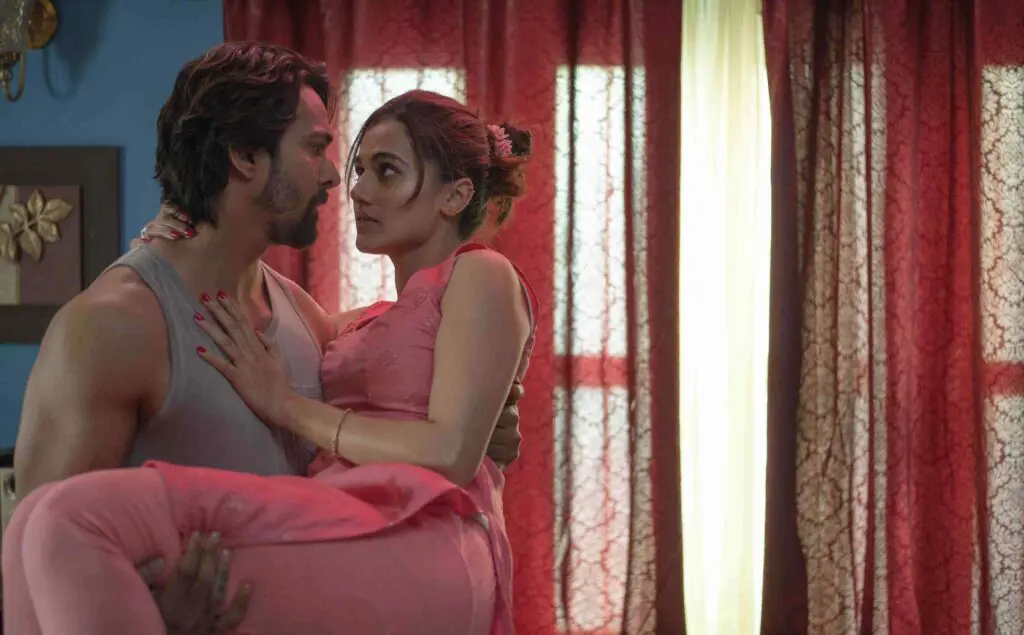Summary
Haseen Dillruba starts with a promising opening and ends with whims. It pushes the edginess to its core for a not-so thrilling love story.
“If love doesn’t push you to the brink of insanity, then it is not true love.”
Haseen Dillruba is a quirky, refreshing Bollywood story that explores the concept between love and lust directed by Vinil Mathew. The film is written by Kanika Dhillon. It reveals a story of a witty 28-year-old, a tempting professional beautician from Delhi, Rani (Taapsee Pannu, Looop Lapeta), who stumbles upon an arranged marriage with Rishu (Vikrant Massey, Ginny Weds Sunny; Sector 36), an awkward engineer from Jwalapur who dreams of having a docile and homely wife.
If I could describe the whole story, it would be like a woman stepping into adulthood. Sentimental, fragile, yet full of distortion and identity crisis. It applies the gender dynamic issue, a spin between masculinity and feminism in cultured areas.
Netflix’s Haseen Dillruba kicks off with a promising beginning. A murder case is yet to be revealed; an explosion in the household; skeletons shattered everywhere; a burned-down kitchen; and the battle of the truth between Inspector Kishore Rawat (Aditya Srivastava, Bhakshak) and Rani.
The underlying theme for the whole film is “the more it reveals, the more blurred out the truth.” The film stitches together a series of past-and-present murder investigations. It unravels the stories over the past six months of Rani and Rishu’s marriage story and her extramarital affair with a vigorous Neel (Harshvardhan Rane) through Rani’s POV.
At the beginning, everything seems like a solid and progressive story. The conflict arises quickly. Rani and Rishu fail to compromise each other’s values and dreams, leading to a toxic-yet-glorified love story. The interesting part of their marriage story is that it actually embodies the small details representing the ongoing issues inside the world of arranged marriage that are still deep-rooted within the cultural country.
The reference of gender stereotypes that runs within the small town communities and Rishu’s family is also something to keep an eye on. It visualizes the domestication and frailty of women. It presents a time where Rani has social disorientation at Jwalapur. She does not have a support system; she gets caged inside the house while getting pressured by her in-law’s mother over doing chores.
Meanwhile, Rishu’s awkward endeavors and tendencies to run from confrontation do not help save their marriage; it increases the physical and emotional distance between them. That’s where Neel creeps in. He is the polar opposite of Rishu. Rather than a solid character, the writer puts him as a visualization of the distinction between Rani’s desire and reality.
But the script does not do much for him either. Although his purpose is to stir the development of the story itself, the narrative about their marriage gets stretched out too far and loses its balance. It moves from a domestic comedy to overwhelming romance, with a touch of forced sinister tropes. It deprives the main ideas and loses logical reasoning, not only in the story but also in how the characters are progressing.
Neither character is crystal clear. They’re full of ambiguity and weariness. We do not get a clear intention behind everything, just sparks of impulsivity. It feels like the actors are the ones who bring the development rather than the direction of the story. Vikrant Massey is the gravity that pulls the whole film together.
The investigation scene is more intriguing to watch, giving us more of a solid and thought-provoking moment. The tension between Taapsee Panmu and Inspector Kishore Rawat is absorbing.
The music itself is repetitive and tedious, but I would say it’s effective enough at certain points. On the other hand, the cinematography and cinematic parallel between the past and present are enough to keep the audience engaged. Netflix sure knows how to tease us with an intriguing teaser.
I was expecting a dark, psycho, romantic thriller... yet Haseen Dillruba is giving me a whole Malatang; a hot mess. It pushes the edginess to its core by presenting us with the tragic story of how far love can go. Some part works; some waste the story itself. Rani describes her relationship with Rishu and Neel as “sometimes it is good, sometimes it is not.” And that is exactly how Harshvardhan Rane is.
Read More: Haseen Dillruba Ending Explained




